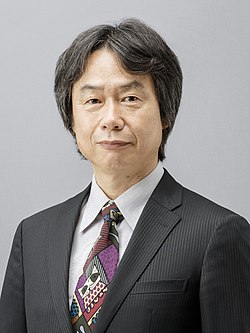Portal:Video games
The Video Games Portal

A video game or computer game is an electronic game that involves interaction with a user interface or input device (such as a joystick, controller, keyboard, or motion sensing device) to generate visual feedback from a display device, most commonly shown in a video format on a television set, computer monitor, flat-panel display or touchscreen on handheld devices, or a virtual reality headset. Most modern video games are audiovisual, with audio complement delivered through speakers or headphones, and sometimes also with other types of sensory feedback (e.g., haptic technology that provides tactile sensations). Some video games also allow microphone and webcam inputs for in-game chatting and livestreaming.
Video games are typically categorized according to their hardware platform, which traditionally includes arcade video games, console games, and computer games (which includes LAN games, online games, and browser games). More recently, the video game industry has expanded onto mobile gaming through mobile devices (such as smartphones and tablet computers), virtual and augmented reality systems, and remote cloud gaming. Video games are also classified into a wide range of genres based on their style of gameplay and target audience. (Full article...)
Featured articles –
Rather than using a turn-based battle system like contemporaneous role-playing games, Secret of Mana features real-time battles with a power bar mechanic. The game has a unique Ring Command menu system, which pauses the action and allows the player to make decisions in the middle of battle. An innovative cooperative multiplayer system allows a second or third player to drop in and out of the game at any time. Secret of Mana was directed and designed by Koichi Ishii, programmed primarily by Nasir Gebelli, and produced by veteran Square designer Hiromichi Tanaka.
The game received acclaim for its brightly colored graphics, expansive plot, Ring Command menu system, and innovative real-time battle system. Critics also praised Hiroki Kikuta's soundtrack and the customizable artificial intelligence (AI) settings for computer-controlled allies. Retrospectively, it has been considered one of the greatest games of all time by critics. It was re-released on Virtual Console on the Wii in 2008 and Wii U in 2013, on multiple mobile platforms (as an enhanced version) between 2009 and 2019, on Switch as part of Collection of Mana in 2017 and 2019, and was remade in 3D in 2018 for PlayStation 4, Vita and Windows. The remake saw mixed reviews, with many faulting its lack of game play improvements and reworked graphics. (Full article...)
Unlike the previous installments, which were set primarily in the town of Silent Hill, this game is set in the southern part of the fictional city of Ashfield, and follows Henry Townshend as he attempts to escape from his locked-down apartment. During the course of the game, Henry explores a series of supernatural worlds and finds himself in conflict with an undead serial killer named Walter Sullivan.
Silent Hill 4 features an altered gameplay style with third-person navigation and plot elements taken from previous installments. Upon its release, the game received generally favorable reviews from critics, but its departure from the traditional formula of the previous games proved to be divisive. However, the game did receive praise for implementing some unique gameplay mechanics like the hauntings within the apartment. (Full article...)
After the success of BioShock, 2K Games formed a new studio, 2K Marin, to create the sequel. 2K Australia, Arkane Studios, and Digital Extremes provided additional support. The developers focused on improving gameplay elements from the first game, and return to the Rapture setting to explore a new perspective of the city. The story received major changes throughout development. Garry Schyman, who composed BioShock's soundtrack, returned for the sequel; he expanded the game's sonic palette to include more blues and religious music to parallel its themes.
BioShock 2 received positive reviews, with praise directed at its narrative, themes, art style, characters, endings and gameplay. Criticisms included a slow start and failure to distinguish itself from its predecessor. Retrospective reviews have been more positive, with some considering it the best in the series. The multiplayer mode was supported with downloadable content, and a single-player campaign expansion, Minerva's Den, released in August 2010. The game sold more than 3 million copies, but did not meet the publisher's sales expectations. A remastered version titled BioShock 2 Remastered was released as part of BioShock: The Collection for PlayStation 4, Windows, Xbox One, and Nintendo Switch. (Full article...)
The game was directed by Fumito Ueda and developed at Sony Computer Entertainment's International Production Studio 1, also known as Team Ico, the same development team responsible for the acclaimed PlayStation 2 title Ico, to which the game is considered a spiritual successor. Сonceived as an online multiplayer game titled NICO directly after Ico's completion, Shadow of the Colossus underwent a lengthy production cycle during which it was redeveloped as a single-player title. The team sought to create an outstanding interactive experience by including a distinct visual design, an unorthodox gameplay template, and non-player characters with sophisticated artificial intelligence such as the colossi and Wander's horse, Agro.
Cited as an influential title in the video game industry and one of the best video games of all time, Shadow of the Colossus is often regarded as an important example of video games as art due to its minimalist landscape designs, immersive gameplay, and emotional weight of the player character's journey. It received wide critical acclaim by the media and was met with strong sales compared to Ico, due in part to a larger marketing campaign. The game won several awards for its audio, design, and overall quality. A remastered version for the PlayStation 3 was released alongside Ico as The Ico & Shadow of the Colossus Collection in September 2011, developed by Bluepoint Games, who later developed a remake in high definition of the game for the PlayStation 4 in 2018. (Full article...)
The game was Rare's first game for the Nintendo 64. Its development team ranged between four and seven members, many of whom were recent graduates. The team sought to find gameplay to fit Rare co-founder Chris Stamper's idea for a building destruction game. The puzzle game mechanics were inspired by those of Donkey Kong (1994).
Blast Corps was released to critical acclaim and received Metacritic's second highest Nintendo 64 game ratings of 1997. The game sold one million copies — lower than the team's expectations — and received several editor's choice awards. Reviewers praised its originality, variety, and graphics, but some criticized its controls and repetition. Reviewers of Rare's 2015 Rare Replay retrospective compilation noted Blast Corps as a standout title. (Full article...)
The development began in early 2005, led by Sonic co-creator Yuji Naka. Sonic Team sought to create an appealing game in the vein of superhero films such as Batman Begins (2005), hoping it would advance the series with a realistic tone and multiple gameplay styles. While it received praise from video game journalists during pre-release showings, problems developed after Naka resigned to form his own company, Prope, and the team split to work on the Wii game Sonic and the Secret Rings (2007). Sonic Team rushed the later stages of development, cutting numerous features and scrapping plans for ports to the Wii and Windows.
Sega insisted on shipping Sonic the Hedgehog in time for the 2006 holiday shopping season and released it unfinished to coincide with the franchise's 15th anniversary. It was released for the Xbox 360 in November 2006 and PlayStation 3 in December to strongly negative reviews. It received criticism for its excessive loading times, camera system, story, voice acting, glitches, and controls. It is widely considered the worst Sonic game and severely damaged the franchise's reputation. Subsequent games ignored its tone and most characters. In 2010, Sega delisted Sonic the Hedgehog from retailers, following its decision to remove all Sonic games with below-average Metacritic scores to increase the value of the franchise. (Full article...)
Pathways began as a sequel to Bungie's Minotaur: The Labyrinths of Crete, before the developers created an original story. Jason Jones programmed the game, while his friend Colin Brent developed the environments and creatures. The game features three-dimensional, texture-mapped graphics and stereo sound on supported Macintosh models. Pathways was critically acclaimed and won a host of awards; it was also Bungie's first major commercial success and enabled the two-man team of Jason Jones and Alex Seropian to move into a Chicago office and begin paying staff. (Full article...)
Did you know... -
- ... that a video game consisting solely of a clickable image of a banana was briefly the second-most played game on Steam?
- ... that Rockstar Vienna was the largest video game developer in Austria when it closed in 2006?
- ... that for at least 90 minutes, Mori Calliope livestreamed herself begging video game developer Atlus to allow her to stream their game Persona 3?
- ... that the name of the video game mod series Bomba Patch was inspired by éclairs?
- ... that classified documents of the United States were partially leaked onto a Discord server for the video game Minecraft?
- ... that Kamibox's video game A Joke That's Worth $0.99 is permanently on special offer because Itch.io does not allow $0.99 as a regular price?
- ... that the game designer of the video game Hades said that the characters were attractive "because Jen Zee"?
- ... that the video game mode Ultimate Team has been criticized for its reliance on loot box packs, considered to be a controversial form of gambling?
- ... that the world's largest video game studio is headquartered in a former textile factory?
- ... that Kim Kitsuragi was praised as one of the best video game characters of 2019?
- ... that the 2014 chariot racing video game Qvadriga was inspired by a 1979 board game?
- ... that fighting video game Panza Kick Boxing was endorsed by a French kickboxing champion who also supplied technical advice?
Selected biography –
Selected image -

Recent video game-related events
- April 4, 2025 – Tariffs in the second Trump administration
- Multiple companies, including Klarna, StubHub, Nintendo, and Professional Sports Authenticator, pause price-sensitive business actions in the U.S. to evaluate the impact of the recent tariff announcements. (The Wall Street Journal) (IGN) (The Verge)
- January 16, 2025 –
- Nintendo officially reveals the Nintendo Switch 2 video game console, the successor to the Nintendo Switch. (Nintendo)
- September 12, 2024 – 2023–2024 video game industry layoffs
- Microsoft announces that it will lay off 650 Microsoft Gaming employees as part of cuts to its workforce. (Variety)
Topics
Categories
Things you can do
In other Wikimedia projects
The following Wikimedia Foundation sister projects provide more on this subject:
-
Commons
Free media repository -
Wikibooks
Free textbooks and manuals -
Wikidata
Free knowledge base -
Wikinews
Free-content news -
Wikiquote
Collection of quotations -
Wikisource
Free-content library -
Wikiversity
Free learning tools -
Wiktionary
Dictionary and thesaurus












































